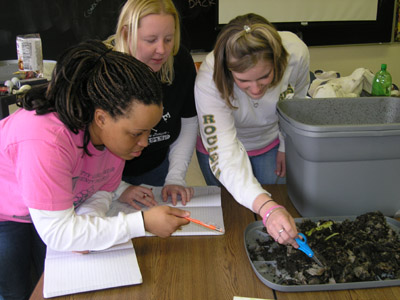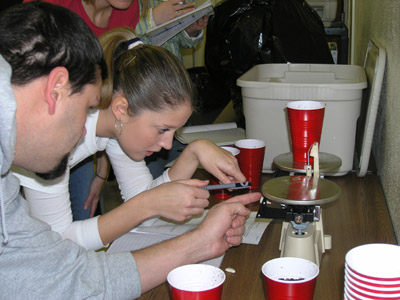

Science Circus
 |
 |
Each student will be given a basic process skill and will create a station for our Basic Process Skill Circus. Your center should be a self explanatory, hands-on, inquiry based experience. In addition to the centery, you should provide a write up with:
Science Process Skills are basic skills of inquiry that are used throughout the science curriculum. People differ on the exact names of some of the skills, but the following list contains much of what you would find in any description.
Basic Science Process Skills
• Observing: Using your senses to gather information about an object or event. This is qualitative data.
• Measuring: Using standard measures or estimations to describe an object or event. This is quantitative data.
• Inferring: Based on observation, inferring involves making some possible explanations.
• Classifying: Ordering or grouping objects or events into categories based upon characteristics.
• Predicting: Suggesting the most likely outcome of a future event based upon previously collected evidence.
• Communicating: Using drawings, words, numbers, or graphs to describe an event or object.
Integrated Science Process Skills
• Formulating Hypotheses: Suggesting the outcome of an experiment. We must be able to test this.
• Identifying of Variables: Stating the elements of an experiment that can be changed to affect the outcome. The variable you want to test should be the only one that changes. The other variables should be controlled. The name of the variable you change is the independent variable, and the name of the one you measure is the dependent variable. All variables that are kept the same are controlled variables or constants.
• Defining Variables Operationally: Explaining how you will measure a variable in an experiment.
• Describing Relationships Between Variables: Explaining how dependent and independent variables relate to one another and how you will compare them.
• Designing Investigations
• Experimenting: Carrying out a repeatable investigation.
• Acquiring Data: Collecting both qualitative and quantitative data during an investigation.
• Organizing Data in Tables and Graphs
• Analyzing Investigations and Their Data• Understanding Cause and Effect Relationships
• Formulating Models: Seeing patterns in data and developing analogies to common experiences.
Resources:
Exploratorium Process Circus Project